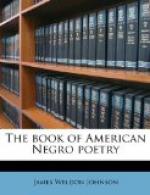Not many of the writers here included, except Dunbar, are known at all to the general reading public; and there is only one of these who has a widely recognized position in the American literary world, he is William Stanley Braithwaite. Mr. Braithwaite is not only unique in this respect, but he stands unique among all the Aframerican writers the United States has yet produced. He has gained his place, taking as the standard and measure for his work the identical standard and measure applied to American writers and American literature. He has asked for no allowances or rewards, either directly or indirectly, on account of his race.
Mr. Braithwaite is the author of two volumes of verses, lyrics of delicate and tenuous beauty. In his more recent and uncollected poems he shows himself more and more decidedly the mystic. But his place in American literature is due more to his work as a critic and anthologist than to his work as a poet. There is still another role he has played, that of friend of poetry and poets. It is a recognized fact that in the work which preceded the present revival of poetry in the United States, no one rendered more unremitting and valuable service than Mr. Braithwaite. And it can be said that no future study of American poetry of this age can be made without reference to Braithwaite.
Two authors included in the book are better known for their work in prose than in poetry: W.E.B. Du Bois whose well-known prose at its best is, however, impassioned and rhythmical; and Benjamin Brawley who is the author, among other works, of one of the best handbooks on the English drama that has yet appeared in America.
But the group of the new Negro poets, whose work makes up the bulk of this anthology, contains names destined to be known. Claude McKay, although still quite a young man, has already demonstrated his power, breadth and skill as a poet. Mr. McKay’s breadth is as essential a part of his equipment as his power and skill. He demonstrates mastery of the three when as a Negro poet he pours out the bitterness and rebellion in his heart in those two sonnet-tragedies, “If We Must Die” and “To the White Fiends,” in a manner that strikes terror; and when as a cosmic poet he creates the atmosphere and mood of poetic beauty in the absolute, as he does in “Spring in New Hampshire” and “The Harlem Dancer.” Mr. McKay gives evidence that he has passed beyond the danger which threatens many of the new Negro poets—the danger of allowing the purely polemical phases of the race problem to choke their sense of artistry.
Mr. McKay’s earliest work is unknown in this country. It consists of poems written and published in his native Jamaica. I was fortunate enough to run across this first volume, and I could not refrain from reproducing here one of the poems written in the West Indian Negro dialect. I have done this not only to illustrate the widest range of the poet’s talent and to offer a comparison between the American and the West Indian dialects, but on account of the intrinsic worth of the poem itself. I was much tempted to introduce several more, in spite of the fact that they might require a glossary, because however greater work Mr. McKay may do he can never do anything more touching and charming than these poems in the Jamaica dialect.




